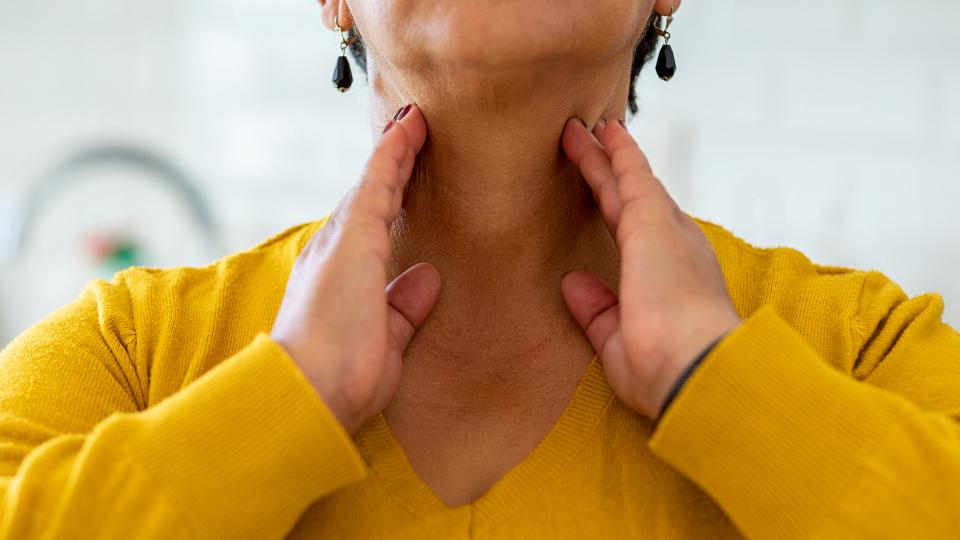Treating Voice, Airway, and Swallowing Disorders
The Voice Disorders Center and surgical specialists at University of Utah Health help you manage conditions that affect your voice, upper airway, and swallowing. These areas are all part of your aerodigestive tract. You may have a condition that affects more than one part of your aerodigestive tract at once.
Our specialists work with in the latest behavioral, pharmaceutical, and surgical treatments for the following:
-
Swallowing disorders
-
Conditions impacting more than one area
Conditions We Treat
Voice Disorders
- Hoarseness related to the following conditions:
- Muscle tension/dysphonia
- Chronic throat pain (lasting four weeks or longer)
- Vocal injury
- Vocal nodules, polyps, cysts, and other benign lesions
- Presbyphonia/aging voice
- Resonance disorders
- Velopharyngeal insufficiency
- Laryngitis
- Neurogenic voice disorders
- Laryngeal dystonia (formerly spasmodic dysphonia)
- Vocal tremor
- Vocal fold paralysis/paresis
Airway Disorders
- Airway stenosis/scarring
- Induced laryngeal obstruction (formerly vocal cord dysfuction/paradoxical vocal fold motion)
- Chronic cough (lasting six weeks or longer)
- Laryngeal papillomatosis
- Shortness of breath
Swallowing Disorders
- Dysphagia
- Globus sensation (throat lump)
Conditions Affecting Multiple Areas
Services
Our services include assessments and treatments by our team of highly-trained specialists. Your first visit might be with a single specialist or with a team of specialists. Our team can diagnose and treat one or more of your voice, airway, and swallowing problems during a group visit. Team visits help you get the right kind of care faster. Individual specialists treat you as needed.
Speech-Language Pathology
- Clinical assessment:
- Voice
- Upper airway (ILO, chronic cough)
- Swallowing
- In-office procedures to assess aerodigestive function:
- Laryngoscopy
- Nasoendoscopy
- Rigid transoral endoscopy
- Laryngoscopy with stroboscopy
- Laryngeal function studies
- Fiberoptic endoscopic evaluation of swallow (FEES)
- Modified Barium Swallow Studies (MBSS)
- Laryngoscopy
- Behavioral therapy to treat the following:
- Voice disorders
- Chronic cough
- Induced Laryngeal Obstruction (ILO)
- Dysphagia
- Parkinson's Disease (SPEAK OUT!®)
- Gender affirming voice care
Vocal Coach
- Assessment of performance voice use (singing, public speaking, etc.)
- Vocal coaching/voice lessons
Surgical Procedures/Laryngology
- Voice assessment
- Airway assessment
- Medical/surgical procedures:
- Laryngoscopy
- Botulinum toxin therapy for laryngeal dystonia and vocal tremor
- Laryngeal electromyography (EMG)
- Vocal fold augmentation injection
- Vocal fold medicalization procedures
- Biopsies
- Vocal fold microsurgeries
- Reinnervation procedures
- Vocal fold reconstruction
- Laser surgery of the larynx
Pulmonology
- Evaluation and treatment of chronic cough
- Management of sleep apnea
- Trach management
- Evaluation and management of airway stenosis
- Additional airway disorders
Find a Voice, Airway, or Swallowing Specialist
Julie Barkmeier-Kraemer, PhD, CCC-SLP
Voice Disorders3 Resulting Health Care Providers
How to Make an Appointment
Location
The Voice Disorders Center is located at
729 Arapeen Drive, Salt Lake City, Utah 84108
You will need a referral from another provider to make an appointment with a voice disorders specialist.
University of Utah Health providers can send referrals through MyChart. Providers who aren't part of U of U Health can fax referrals to 801-587-3569. Please call 801-587-3550 with questions.
Our schedulers ask you questions when you make your appointment. These questions help our team know which specialists should join your first visit. You get the best care when you meet with a group of specialists, depending on your symptoms.
Why Choose University of Utah Health?
Our team provides exceptional and comprehensive voice, swallow, and airway health care to children and adults. Patients across five states in the Mountain West region benefit from our innovative research, education, and personalized attention. We offer state-of-the art and evidence-based assessment and treatment options, including medical, pharmaceutical, surgical, and behavioral therapy approaches.
Our team consists of experts from the several disciplines:
- Otolaryngology (ear, nose, and throat)
- Pulmonology (lung and breathing system)
- Speech-language pathology
We strive to create a trusting relationship with compassion, respect, and commitment to exceptional patient care. With our nationally recognized clinical fellowship training program, we train future specialists to continue this same quality of care.






